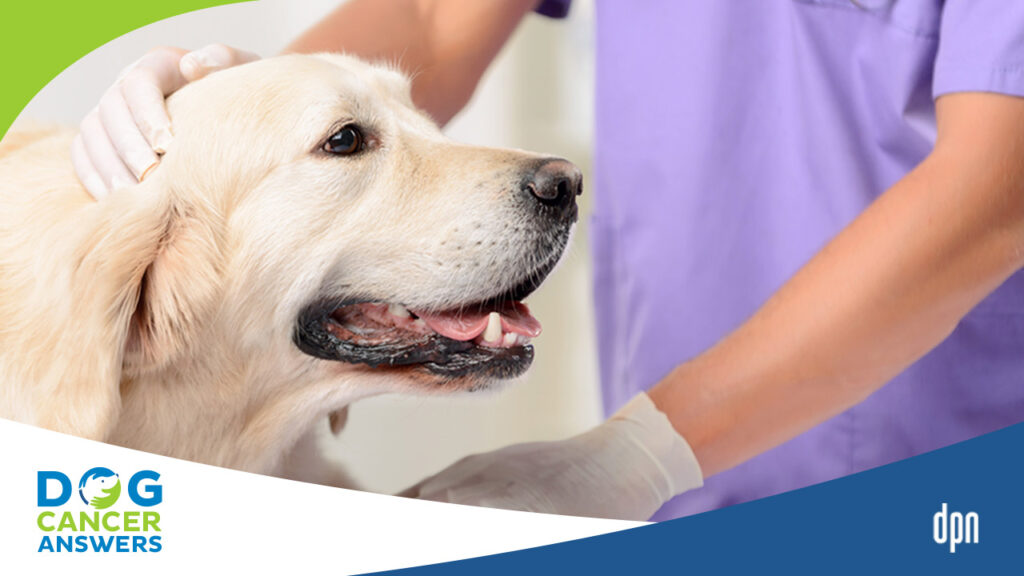EPISODE 155 | RELEASED February 21, 2022
Choosing the Right Clinical Trial for Your Dog | Dr. Craig Clifford Deep Dive
Worried about paying for dog cancer treatment? Want access to the newest options? A clinical trial might be the right fit for you and your dog.
SHOW NOTES
Veterinary oncologist Craig Clifford loves clinical trials. Why? Because they give him early access to some of the newest treatments and therapies, and provide cutting-edge care to patients at a decreased cost – or even completely free.
Dr. Clifford goes over how to find clinical trials and how to evaluate if a particular trial is the right fit for you, from covered expenses to how placebos are used and how many follow-up visits will be needed. The information and results gathered from clinical studies help to get treatments and medications fully approved, making them accessible to more of our beloved dogs.
Links Mentioned in Today’s Show:
AVMA Animal Health Studies Database
Related Links:
Veterinary Cancer Society Clinical Trials Database
BluePearl Specialty & Emergency Pet Hospital Clinical Studies
[00:00:00] >> Dr. Craig Clifford: You know, to me, if it’s a pure placebo and that’s it, it’s not something our group will do because it’s not benefiting the owners. It’s only benefiting the company and I just ethically, personally have issues with that.
[00:00:13] >> Announcer: Welcome to Dog Cancer Answers, where we help you help your dog with cancer. Here’s your host, James Jacobson.
[00:00:22] >> James Jacobson: Hello friend. Today’s episode is about one of those rare topics in dog cancer that is truly a win-win. And that is clinical trials. Researchers win because they learn more about a drug or a therapy. And we win because we can get discounted and sometimes free veterinary care. And our dogs win because they get access to cutting edge treatments before they’re available to the general market. To tell us more about the ins and outs of clinical trials for dog cancer, we are joined by Dr. Craig Clifford. Dr. Clifford is a boarded oncologist who loves these studies. He loves them so much that he created a hybrid private practice so that he could both provide standard veterinary care and he could participate in lots of clinical trials.
Dr. Clifford, welcome. At this point, you have been involved in, I don’t know, like 15, or actually, how many are you working on now?
[00:01:22] >> Dr. Craig Clifford: Uh, currently due to COVID our numbers got cut down. We probably only have about five ongoing clinical trials, but we have another five or six that are in the works. So COVID definitely put a stop to it only because a lot of times clinical trials involve sponsors coming in, and moderators coming in to check out supply and stuff like that. And since we couldn’t let people in the hospital, clearly we couldn’t allow the clinical trials to go on. So we had a, almost a year hiatus, unfortunately, as a result of it, but things are moving forward now so I’m pleased.
[00:01:55] >> James Jacobson: So what I wanted to discuss in today’s episode is if you have a dog with cancer or pretty much any other type of serious illness, and you’re looking for like all sorts of things to do, one of the things that often people suggest is, well, maybe you should get a clinical trial. What are the things that folks should think about when they think about enrolling their dog in a clinical trial?
[00:02:21] >> Dr. Craig Clifford: Yeah, that’s a great question. So I think, uh, first and foremost, if an owner is looking to get all the information they possibly can, uh, the AVMA does have a clinical trial database. So you literally type in AVMA, American Veterinary Medical Association and clinical trial database, it pops up. It’s not perfectly user friendly, but it will list cat or dog and it’ll list the specific disease type. So you can really not just say cancer, but if your dog has say, for instance, lymphoma, you can search under lymphoma clinical trials and then see what is in the nearby area. And this is also true even for non-cancer diseases: diabetes, Cushing’s disease, things like that. So that’s the first step.
[00:03:01] >> James Jacobson: And in a typical year – I know we are not in a typical year, even now in 2022 – but in a typical year, how many clinical trials are being done across the United States?
[00:03:12] >> Dr. Craig Clifford: Oh, several hundred usually. Yeah.
[00:03:14] >> James Jacobson: Okay.
[00:03:14] >> Dr. Craig Clifford: Between university, private practice, and then industry sponsored trials, usually there are several.
[00:03:20] >> James Jacobson: And is the great majority of those in oncology?
[00:03:24] >> Dr. Craig Clifford: No, they vary. I think oncology probably leads the field. Internal medicine is probably pretty close if not tied with it only because they have so many smaller trials that are going. So, you know, that’s what the owner needs to then look at. You know, once they’ve seen the possibility for a trial, to me, the next thing that needs to be looked at is the funding of it.
You know, and this is where, you know, as we had mentioned in our last podcast, that it’s very, um, for me, it’s a great thing when I have owners that have limited financial means that I can offer a fully funded trial. So that’s the other thing the owner needs to look at. Is it fully funded or will they have to pay some of it? And if so, how much? Because that may influence whether they can go forward with it.
[00:04:04] >> James Jacobson: Got it. Okay. So once they’ve checked the AVMA site and found a trial that may have a connection with, you know, what their dog is going through and what their diagnosis is and they can find out the, a little bit about the financial component of it, which is like, am I going to be shelling out money?
Or is this fully funded? And when it’s funded, it’s usually funded by either a pharmaceutical company or a university, or who is actually doing the funding?
[00:04:30] >> Dr. Craig Clifford: Or grant.
[00:04:31] >> James Jacobson: Or grant.
[00:04:31] >> Dr. Craig Clifford: It may be a grant that an investigator had put in and that’s covering it. But usually most of the ones that we do, we’re either partnering with the university or it’s sponsor driven. Say we have a drug that needs to get fully approved in order to be out there and sold. And the goal is to run the trial. It’s called the pivotal trial and that’s, the data from that gets presented to the FDA in order to then have the drug out there. So.
[00:04:55] >> James Jacobson: Maybe, and this is a good time to talk about the different types of trials. You’ve mentioned pivotal trial, how many different types of clinical trials are there?
[00:05:03] >> Dr. Craig Clifford: Well, I mean, most of the trials are called prospective clinical trials where basically we’re enrolling patients, whether it’s for a new diagnostic or for a new therapy. And prospective means we’re, we’re doing it live at one time and bringing it forward. There are what are called retrospective studies, but those are not clinical trials.
Retrospective is a bunch of clinicians look at cancer A that was treated with drug B, and how did all of our cases do? And we put our data together and come up with an answer. That’s not quite as strong as a prospective trial, because a prospective trial, everyone gets the exact same thing. So there are no biases, there’s no differences. Everyone fits and they get put into it.
[00:05:42] >> James Jacobson: Is that what they consider the gold standard when they talk about-
[00:05:45] >> Dr. Craig Clifford: You got it.
[00:05:46] >> James Jacobson: -placebo controlled, multi university, multi-center.
[00:05:49] >> Dr. Craig Clifford: Multi-center. You got it. And generally, and that brings up a great point you brought up this placebo controlled. Because in general, when a person is looking at it, if it is a placebo controlled type of study, they really need to look at that because they need to understand that there is a percentage chance that they may get the placebo. So for our group, we will only enroll in placebo based trials if it has, what’s called a quick trip, uh, tripwire, meaning if the case progresses within two days, they can jump off and then the owners will receive some monetary compensation to attain the standard of care. Or it may be the trial then allows them to cross over and receive the drug in question. You know, to me, if it’s a pure placebo and that’s it, it’s not something our group will do because it’s not benefiting the owners. It’s only benefiting the company and I just ethically, personally have issues with that.
[00:06:45] >> James Jacobson: So that’s a thing to be looking out for is a quote unquote, quick tripwire, and is that a common parlance?
[00:06:50] >> Dr. Craig Clifford: You got it.
[00:06:50] >> James Jacobson: Is that commonly?
[00:06:51] >> Dr. Craig Clifford: You got it. You got it. It’s just something that if my pet gets placebo and I fail, can I A, crossover to the other group or do I receive some type of compensation that I can undergo standard of care. Because then it’s easy to look at the owner and say, look, no matter what, you’re getting the drug, or no matter what you’re getting standard of care.
So there’s no reason that you shouldn’t want to enroll in this. If it’s truly just placebo, then I agree with you a hundred percent, you know, then it’s concerning because I may be doing a disservice to that patient.
[00:07:20] >> James Jacobson: So to get the gold standard, to have the placebo control, it needn’t be for the full duration. It could be for a short thing and then have one of those tripwires.
[00:07:28] >> Dr. Craig Clifford: Yep. As long as you’re able to have a tripwire that shows there’s progression and then those numbers can be associated with the placebo, then they can move on to something else.
[00:07:37] >> James Jacobson: This concept of a tripwire is fascinating. Is this something that is created in the clinical study design?
[00:07:44] >> Dr. Craig Clifford: Yep.
[00:07:45] >> James Jacobson: And so there’s obviously financial components to it because it’s going to cost more than if there wasn’t a tripwire. And you say those are the only ones that you do at your practice.
[00:07:55] >> Dr. Craig Clifford: Exactly.
[00:07:55] >> James Jacobson: Easier to enroll. Are most veterinary oncology studies, do they have a tripwire?
[00:08:01] >> Dr. Craig Clifford: Most will allow a crossover. When investigators or a company is putting together a study, they take that into account because they know, how am I going to enroll X number of patients if many of them may look at it and be like, there may not be a benefit to me because if I end up in the placebo group, I’m not getting anything.
[00:08:17] >> James Jacobson: Okay.
[00:08:18] >> Dr. Craig Clifford: So, you know, to me, I think most of the groups will tend to put something like that into it.
[00:08:22] >> James Jacobson: Okay. That makes sense. Okay. So you, you found the study, you figured out the financial components, you hopefully have found a study with a tripwire.
What are some other considerations?
[00:08:32] >> Dr. Craig Clifford: I mean, the next step is where are they located? So is it something that you’re able to get to. And then setting up a, you know, a consult to see if your pet is eligible, because oftentimes diagnostics will need to be done to see if they’re eligible. So there is a chance that the owner may make a, you know, 200 mile drive to enroll in a clinical trial only to find out that they’re not eligible.
[00:08:53] >> James Jacobson: What is the furthest you’ve seen someone travel to, to participate in a clinical trial?
[00:08:58] >> Dr. Craig Clifford: We had someone come down from Canada for a clinical trial that we were doing. So they were driving the dog 8 to 10 hours, um, in order to be able to do it.
But that brings up a point too, because usually when we’re putting these clinical trials together and we come up with what we call an owner consent, we also have to make sure the owner can come, you know, that they can make all of them. Because if an owner is coming from a distance, such as that – now it was during the summer, so not an issue, but you can imagine, you know, we were talking about the lovely winter we could be having, you can imagine Canada, to try to get out and drive eight hours is a whole lot different than coming from Canada during the summer. So, you know, that plays a role because if the patient can’t stay on schedule, or misses appointments, now their data loses its validity and that doesn’t help anyone, you know.
[00:09:44] >> James Jacobson: And so, okay. So, and obviously that was probably pre COVID in terms of crossing international.
[00:09:49] >> Dr. Craig Clifford: Yeah. Yes, it was.
[00:09:51] >> James Jacobson: So what other things would one want to consider if you’re looking at it, you can?
[00:09:56] >> Dr. Craig Clifford: Other things would be looking at, for the clinical trial, looking at the product itself. Is there any data for it? Is this the first trial with it? Where do we have other data to show that it’s safe and that it’s, has some efficacy? Meaning, do I have a chance that I could help my pet being part of this clinical trial or am I solely entering it because I don’t have the finances and I want to do something?
[00:10:17] >> James Jacobson: And where can you get that safety and efficacy data?
[00:10:20] >> Dr. Craig Clifford: A lot of times it’ll be, when you look at the trial itself, in the overview of it, they will describe the product and describe any data that may have been done beforehand. And also during, sometimes it’s going to come from the, the appointment where you’re meeting one of the investigators and they’re describing it with you, because oftentimes, when you go on the clinical trial database, it’s like three paragraphs of information and that’s it. And so, you know, they can’t put too much in that section. So a lot of it would be calling to ask questions beforehand or asking those questions during the screening visit.
[00:10:52] >> James Jacobson: Well, as you talk about questions to ask either beforehand or during the screening, what are some other things that you wish more clients who are considering enrolling asked first?
[00:11:04] >> Dr. Craig Clifford: Medications that they’re on, you know, that could prevent them from being on the clinical trial. So we do know that a lot of times, many owners are giving over the counter or alternative medicines. And in many cases, some of those may prevent the pet from being part of the clinical trial.
[00:11:21] >> James Jacobson: And when you say alternative medicines that includes supplements?
[00:11:24] >> Dr. Craig Clifford: Uh huh.
[00:11:24] >> James Jacobson: Okay.
[00:11:25] >> Dr. Craig Clifford: And, and holistic meds.
[00:11:26] >> James Jacobson: Uh huh.
[00:11:26] >> Dr. Craig Clifford: Because you know, some of these, we don’t know if they have efficacy. We don’t know if they could make it harder for the drug to work. And we don’t know if they could give us a better result or a worse result or more side effects. So as you can imagine, anytime you have a clinical trial, you want it to be as clean as possible, and it may be they need a wash out before they can enroll.
[00:11:46] >> James Jacobson: You want to remove all the variables so that you can actually-
[00:11:48] >> Dr. Craig Clifford: You got it.
[00:11:49] >> James Jacobson: -test if, if the drug is having an effect.
[00:11:51] >> Dr. Craig Clifford: Uh huh.
[00:11:51] >> James Jacobson: What risks are there to the dog?
[00:11:56] >> Dr. Craig Clifford: Again, that’s where I think the clinical investigator needs to talk with the owner because usually we’ll put those in there that there is a risk with this product of potential hospitalization, or theoretically, if it is a drug, could it be something that could cause death. Although it not anticipated, you know, it depends upon what the trial is. So in a pivotal trial, we already know the dose. And what we’re doing is treating a large number of patients. Early on, you have trials where you’re trying to find the dose. So, what happens is we start very low and then we raise it up. And we usually do it in cohorts of three dogs.
And if they tolerate it, we keep going up and up and up. So the concern of course, is we’re eventually going to hit a dose that is toxic. And is that possible that that could lead to, you know, adverse events to the pet or being hospitalized, et cetera. So I think understanding the trial, where the drug is in its development: am I very early on, and we have hardly any data and we’re just trying to use this to figure out the dose of the drug? Or do we have a whole bunch of data and I know how the drug does, and I’m just going to get the drug as part of this pivotal trial, which are the best ones, because you already know everything about it. And usually they have the best funding.
[00:13:08] >> James Jacobson: Got it. Okay. Okay. So the first one that you talked about, which I believe is called dose escalation studies, right?
[00:13:13] >> Dr. Craig Clifford: Yup.
[00:13:14] >> James Jacobson: And those are sometimes, they’re done very early on in the process, and that’s where people can get a little nervous because there really will be adverse events eventually, ’cause that’s the idea of what does escalation is, right?
[00:13:28] >> Dr. Craig Clifford: Exactly. The challenge with those is the patients who enroll early are probably getting too low of a dose, and the patients who enroll late theoretically could be getting a higher end dose.
[00:13:37] >> James Jacobson: And how candid are the investigators? If you’ve listened to this episode and understand like, you know, where you’d want to be, if you are entering in the dose escalation study, how candid are the investigators?
[00:13:50] >> Dr. Craig Clifford: I mean, in general, most places that are doing clinical trials are going to be very candid about everything because the last thing we want is an owner that bags out and we lose all the data or an owner then, you know, isn’t happy with how things went and decides to, you know, vent on social media. All of those things can negatively, you know, influence the trial itself.
So we’re going to be as honest as possible to let them know the pros and cons. So, you know, traditionally for me, I’ll always talk about standard of care first. Even if an owner is coming for the trial, if I have an osteosarcoma, I’m going to do the whole schpiel for what is standard of care. And then talk about the clinical trial. I would never talk about a clinical trial first.
[00:14:33] >> James Jacobson: Okay. So how do the drug makers and the investigators do the enrollment process? Like, I think enrollment is the term that is used. What are some typical ways that they, that they enroll candidates for these studies?
[00:14:47] >> Dr. Craig Clifford: Uh, you mean like marketing-wise?
[00:14:48] >> James Jacobson: Marketing-wise. Yeah.
[00:14:49] >> Dr. Craig Clifford: Yeah, I mean, certainly the clinical trial database is wonderful because, you know, that goes literally across the entire world theoretically. We’ll do a lot of local marketing to all of our primary care doctors. We’ll do email blasts. We’ll put things on our website. And then the other thing that we have done, which has been incredibly helpful is, if we have a trial that we really are looking for a good number of cases, we’ll put a little blurb on it on the bottom of each discharge and referral letter. The vet may be getting a letter from the dermatologist, and on the bottom it talks about a clinical trial. Because the problem we found with mailers or a blast is everybody looks at it for a second, then they put the piece of paper away – which we all do, I mean, I don’t keep stuff on my desk, you know – but with this, they’re consistently getting hit with it. And we have found that that has helped our numbers.
[00:15:35] >> James Jacobson: Okay. So is that sometimes a challenge, to find, uh, suitable candidates for these studies?
[00:15:41] >> Dr. Craig Clifford: Yeah, it depends upon the clinical trial, but some studies are very, very specific and sometimes patients don’t meet the criteria. And then we’ve often found, we don’t know why this is, but it’s a running joke amongst clinical trial people is that, you know, you’ll be, say you’re doing, you’re gonna do a melanoma trial. You’re seeing tons of melanomas, you’re super excited, I have so many cases I’m gonna be able to help. You start the trial, and it’s crickets. You know, it’s like, it’s like they all went away for about, you know, a couple of weeks. And then all of a sudden it kinda, it clicks in but, invariably it always happens that you overestimate the number of cases you think you’re going to get.
[00:16:15] >> James Jacobson: We’re going to take a short break, but we will be right back with more insight on clinical trials for dog cancer.
And we are back. So obviously, Science, and with a capital S, has been in the news a lot recently over the last few years. Have you noticed that there is a greater appreciation? Are you hopeful in terms of seeing that people are more interested in science and participating in clinical trials? Or, or the opposite?
[00:16:46] >> Dr. Craig Clifford: No, it’s definitely been that. I’ve been very blown away by the owners that we have for our clinical trials. Maybe we’ve just been lucky in how we’ve done it, but they are the owners that are the most thankful because many of them may be entering because they don’t have the financial means. And you know, the most gratifying thing is we’ve had some cases that have jumped from trial to trial, and the owner says my dog is still here because of you. You know, and if they didn’t have the money to afford, the pet would have been put to sleep in a short period of time. So to me, I think many owners are looking for something else, you know, besides standard of care, or something new, and many come in with that.
And sometimes even when they come in with the idea, I want to do the trial, we still go through the standard of care. And many of them may decide upon the standard of care when they hear more information about the trial. And that’s where the clinician needs to be honest about it.
[00:17:37] >> James Jacobson: Is there a story or two that really stands out in your memory, having done so many?
[00:17:42] >> Dr. Craig Clifford: No I just, I mean, again, I remember I have at least two or three dogs that I know had gone through multiple lymphoma trials that helped pay for all of their staging, for their treatment, then they received money for standard of care. When the dog eventually failed, they were able to then go back into another clinical trial.
So the owner had no problem with it, it was a wonderful owner. So it was really rewarding that this owner just touted trials and said, oh my God, they’re the greatest thing in the world. You know, it’s saved my dog.
[00:18:11] >> James Jacobson: Now, not all veterinary oncologists participate in clinical trials. Why do you?
[00:18:16] >> Dr. Craig Clifford: Oh, I mean, I love it.
As I said, I think in our, our first chat we had, you know, I am, I’m somewhat of an academic at heart in that, you know, I have an academic mentality on some level, but I love being in private practice. So, you know, what I tried to create was a hybrid, you know, a way that I can do many of the things that they do in academia – publishing clinical trials, lecturing, et cetera – but do it in a private practice setting.
And, um, that has worked out very well. And there are a number of contract research organizations that only work with private practice, not necessarily university. So that has helped too. We’re part of several networks. So they do all the heavy lifting, we’re part of their network and they come to us and say, Hey, we got this trial, here’s the deal, do you want to be in, yes or no? And that’s wonderful because that’s a lot less work for us because they’ve worked with the company, ironed out all the details for the trial and everything, come up with a budget, and all we have to do is say yes.
[00:19:13] >> James Jacobson: For, so from an end user’s perspective, do you think that it makes a difference whether you’re going to a big veterinary university or going into a small clinic for participating in these trials?
[00:19:24] >> Dr. Craig Clifford: I think it varies. You have to, I think you have to just look at the trial itself and compare them individually as to what they’re doing.
But oftentimes the same trial may be run in private practice and university. Um, most of the time you’ll see that where they’re both being involved. But there are some trials that are truly more university and those are the ones that are much more intensive, labor-intensive, and it’s because the university has the infrastructure for it.
You know, running trials in practice is not easy. It took me a long time of banging my head against the wall because, where I initially worked, you know, the, originally the owner didn’t foresee any benefit to them. Then we started doing them and saw the PR that came associated with it and also saw that it brought in revenue and all of a sudden, why aren’t we doing more clinical trials?
You know, I’m like, ’cause they’re hard, you know, because they require more work than just seeing normal patients. So there is a lot more to them. So I think it has to be the right individual, and you have to be in the right hospital that has the infrastructure for you to do it. You know, oftentimes it’s important to have a clinical trial nurse. All of my nurses are involved in them, but usually one will be the main person for each study. And it’s great because they literally become vested and they take ownership of the trial.
[00:20:33] >> James Jacobson: Because you were saying that, I mean, it’s way more difficult, more time consuming, I guess, than just seeing patients, because you then have to chronicle what’s going on. And is that where the nurse fits in?
[00:20:43] >> Dr. Craig Clifford: Yep. Yep. Plus there’s things that only the doctor can fill in. So usually there’s two databases. You have your own medical database that you, when you see a case you fill in, and then usually for each study, there’s an electronic database that you have to log in separately. So it is double the amount of time to do them.
[00:21:00] >> James Jacobson: Got it. And then in terms of, you said that, you know, your practice owner kind of said, Hey, this kind of makes sense because they are receiving the extra fees in terms of services, as well as, as your time. So it can be worth it for a small practice.
[00:21:12] >> Dr. Craig Clifford: Exactly. And then we’ve also found that many of the clinical trial owners, you know, it may have been, they were in a tough spot financially. And once the trial ends and say the patient needs further therapy, now they’re willing to do it. So it’s not like it’s taking away from, you know, a case that we would have treated normally per se. Oftentimes they’re coming specifically for the trial. So to me, it’s additional cases, not addition by subtraction.
[00:21:38] >> James Jacobson: So in addition to helping dogs with cancer, is there some benefit to people?
[00:21:45] >> Dr. Craig Clifford: Yeah, as we know, many of the cancers that we have in veterinary medicine are translational models for that in people. So the disease is very similar between the two species. So there are, probably more university trials, that are a trial under that auspice, you know, looking at disease X, which is also in people, and comparing a new product.
And it may be that product is designed to go to people and it’s being done mainly in dogs to learn more information about it. So sometimes we’ve worked with products that were not designed to go to dogs. They were designed to go further on the physician-based side.
[00:22:20] >> James Jacobson: Now let’s talk a little bit more about that ’cause I know that the National Cancer Institute has this comparative oncology program. Do results from clinical trials on dogs make it into that, or do you know?
[00:22:32] >> Dr. Craig Clifford: Yup. Yup. Oftentimes National Cancer has the, you know, the clinical oncology group that they have of multiple universities, and they basically run translational trials where the data from that is designed to benefit not only dogs or cats, but then also designed to benefit people. So many of the trials they run are designed specifically to be translational models.
[00:22:54] >> James Jacobson: Now, in terms of the process and in terms of the things that are probably not often spoken of: a necropsy is sometimes, often performed in these trials?
[00:23:04] >> Dr. Craig Clifford: I think it depends upon the clinical trial. You know, usually the ones that we’ll be involved in, we try to make sure it’s not something that is forced on an owner because the last thing you want is, you know, God forbid something happens and they’re far away and they don’t know what to do.
So, but we do tell them if something unexpected were to happen, and God forbid, a patient passed during a trial and we don’t know why, and we need to find out more information, that may be something. But most trials will give the owner the out for that.
[00:23:33] >> James Jacobson: So it’s not required and it’s not that common.
[00:23:35] >> Dr. Craig Clifford: I’ve never been in a trial where it is, has to be required. Because then you’re right, that’s a tough sell for some people, you know, even if they’re getting a, you know, a free cremation with that, it’s not what they want. And it’s also scary because, why are you bringing this up? You know, we always have to bring that up and it’s in our Owner Consent that something can happen, but we tell them, look, we just have to mention this, we don’t foresee it. I mean, even in trials that we’re doing just blood draw trials, we list, like if the patient were to pass or something. And we tell them clearly we don’t think that, it’s just the standard part of all informed consents.
[00:24:09] >> James Jacobson: Okay. So the lawyers have spent a lot of time figuring out all the things that need, that could possibly go wrong and creating indemnifications. Is it basically "boiler plate" in air quotes or are there things that one should really look at and consider as they review the consent?
[00:24:26] >> Dr. Craig Clifford: I mean, I, again, I think it goes back to where is the drug in its history? So are we very early on where we’re still learning a lot and we don’t know a lot about the drug, thereby the risk of an adverse event could be higher, or are we in the process of, as we mentioned, a pivotal trial where this data is going to allow the drug to be sold.
That’s much farther along, so we know a lot of information about the drug, and that’s an easier sell. Those are much easier sells.
[00:24:52] >> James Jacobson: And when you look back on all the trials that you’ve been involved with, is there one that sticks out as like, I really liked that one, that was kind of cool.
[00:25:01] >> Dr. Craig Clifford: Um, I would say there was an interesting one we were doing with a, a particular bacteria that could grow inside an anaerobic environment, meaning tumors, where there’s not a lot of oxygen. And, um, this was an, pretty fast growing bacteria where, you know, dogs would be injected and all of a sudden, you know – and they were designed to have surgery done on it, but they ended up having surgery, almost every dog, within like a day or two because it grew so fast inside the tumors that we needed to jump to surgery quickly.
So that was, uh, an interesting study and it was a little, a little scary at first, um, I gotta be honest, to see these patients coming back and they need an emergency surgery to have it because the agent worked so well.
[00:25:46] >> James Jacobson: Hmm. Wow. So if you had a dog with cancer, right, is there any situation in which you would not agree to do a clinical trial?
[00:25:56] >> Dr. Craig Clifford: For my own dog?
I mean, certainly if it’s a placebo based and there’s no benefit to them.
[00:26:01] >> James Jacobson: Okay.
[00:26:01] >> Dr. Craig Clifford: Not something I would do, especially if there was very little data for it. Um, it’s not something that I would push.
[00:26:06] >> James Jacobson: Okay. That would be the big red flag for you.
[00:26:09] >> Dr. Craig Clifford: Yup. Yup. The other point to bring up was when you talked about screening, certainly we screen the patient, but we also screen our owners. Because, you know, we definitely have some owners that are not the best for clinical trials, you know.
[00:26:22] >> James Jacobson: How’s that?
[00:26:23] >> Dr. Craig Clifford: May be an owner that’s notoriously late, an owner that misses a lot of appointments or, you know, what some owners don’t realize is as part of many of the trials, they often have a diary they need to keep, and anything they put in that diary can be considered an adverse event. An adverse event is anything that is different.
So I’ve literally had to write down an adverse event that they took the dog to Philadelphia, and the dog did not like Philadelphia. So I literally had to put that as an adverse event.
[00:26:52] >> James Jacobson: The City of Brotherly Love is an adverse event for this one drug. Hopefully it didn’t affect the results of the trial too much.
[00:27:01] >> Dr. Craig Clifford: Well, we had to have a long talk with the owner that, this is what the diary is for, those superfluous things do not go in the diary.
[00:27:08] >> James Jacobson: So a lot of this fits in the, in the term "compliance," right? Is this sort of compliance? So you’re looking for an owner who is going to be compliant and agree to what is part of the process in terms of the scientific discovery. Is that kind of a learning challenge for some people to, to kind of, you know, realize that they are in fact a participant themselves by keeping the journal and, and making sure the dog is getting the drug, if there’s a drug or something like that, that they have to administer at home on a certain time?
[00:27:38] >> Dr. Craig Clifford: Uh huh. Yeah. I mean, we spend a lot of time, uh, the clinician and the nurse, going through it with the owner to let them know what they need to do. Because you know, some of the cases, some of the studies we’ve done, everything was electronic, including the diary. And believe it or not, there are still some elderly people that have, don’t have email and don’t have internet.
And we were like, you’re probably not a good person for this clinical trial because it involves using the web.
[00:28:03] >> James Jacobson: Got it.
Well, Craig Clifford, thank you so much. Is there any final thoughts that you’d want to share with us about clinical trials?
[00:28:11] >> Dr. Craig Clifford: No, I think the most important thing is doing your homework. So, you know, certainly looking at the AVMA clinical trial database, I would certainly recommend doing. The other thing is nearby universities or referral clinics, asking or looking on their websites to see what clinical trials they do.
If it is a corporate owned clinic, then you can go to their main website. Like for MARS, you have VCA and BluePearl, you know, you can look at both of them. Ethos is another one. So all of these corporates all have their own clinical trials that they’re doing. So you can look under AVMA or look under the individual.
So the owner has to do their homework, is what I’d recommend, certainly beforehand, but they’re there and they’re designed to help.
[00:28:50] >> James Jacobson: And to help you do your homework, we will put a link – a lot of links – in our show notes and on our website at DogCancerAnswers.com where you can find resources if you’re hunting down a clinical trial for your dog.
Dr. Craig Clifford, thank you so much for being with us today.
[00:29:07] >> Dr. Craig Clifford: I appreciate it.
[00:29:08] >> James Jacobson: And I would like to thank you, listener, for tuning in and joining us today on Dog Cancer Answers. Please check out the show notes for all the links and resources that were mentioned by Dr. Clifford. You can find those either in the show notes for this episode in your podcast app or on our website at DogCancerAnswers.com. And if your dog has been enrolled in a clinical trial, we invite you to tell us about your experiences. You can do that by calling our Listener Line, if you have a question. That Listener Line number is (808) 868-3200. Again, (808) 868-3200.
And it is available 24/7. We might feature your experience or your question about your dog on a future episode of Dog Cancer Answers. We also encourage you to join us in our Facebook group, and you can find that at DogCancerSupport.com. DogCancerSupport.com is a quick link to our Facebook group. It is a vibrant community of dog lovers just like you, sharing their experiences with dog cancer.
Well, that is all for today’s episode. I hope you enjoyed it. I hope you’ll tell a friend about it, and maybe even tell your veterinarian about Dog Cancer Answers. I’d like to thank you for listening and on behalf of all of us here at Dog Podcast Network, I’d like to wish you, and your dog, a very warm Aloha.
[00:30:46] >> Announcer: Thank you for listening to Dog Cancer Answers. If you’d like to connect, please visit our website at DogCancerAnswers.com, or call our Listener Line at (808) 868-3200. And here’s a friendly reminder that you probably already know: this podcast is provided for informational and educational purposes only.
It’s not meant to take the place of the advice you receive from your dog’s veterinarian. Only veterinarians who examine your dog can give you veterinary advice or diagnose your dog’s medical condition. Your reliance on the information you hear on this podcast is solely at your own risk. If your dog has a specific health problem, contact your veterinarian.
Also, please keep in mind that veterinary information can change rapidly, therefore, some information may be out of date. Dog Cancer Answers is a presentation of Maui Media, in association with Dog Podcast Network.








